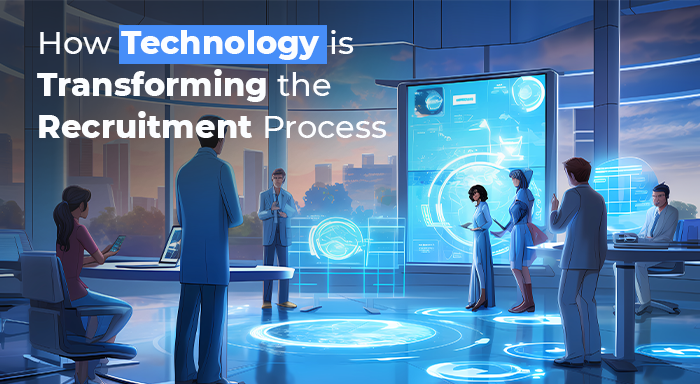Technology has significantly altered how companies manage the employment process in the last decade. A more efficient, tech-driven hiring environment has replaced traditional approaches, which traditionally relied on human intuition and manual procedures.
Recruiters can now swiftly identify the best resumes from thousands of applicants using tools like automated systems, machine learning, and artificial intelligence (AI). Companies and candidates can now participate in the employment process more easily from any location thanks to digital evaluations, remote hiring platforms, and video interviews.
That’s what we will help you understand in this post. In this blog post, we'll demonstrate how technology is changing the hiring process and the new options it presents for employers and candidates.
1. Automated Resume Screening
One of the most significant challenges recruiters face is sorting through hundreds or even thousands of resumes for a single job opening. Traditionally, this task consumed hours, but today, Applicant Tracking Systems (ATS) has become a game-changer.
ATS software automatically filters the best resumes based on specific keywords and qualifications, allowing recruiters to focus only on the most suitable candidates. This technology decreases human error in applicant filtering and expedites the recruiting process.
2. Enhanced Candidate Sourcing through AI
Artificial Intelligence (AI) has become a key player in recruitment, helping companies search for talent in more strategic ways. AI-powered recruitment solutions can find applicants that fit a company's requirements by analyzing data from several sites, such as social media, job boards, and LinkedIn.
These tools assist recruiters in identifying passive applicants who may not be actively seeking employment but would be a perfect fit for the position Teams often partner with Atrium Global to implement direct sourcing programs that activate passive talent pools and reduce time to hire by taking into account variables.
This will include the parameters like location, experience, and skill set. Instead of spending hours seeking prospects, recruiters may concentrate on interacting with them by utilizing AI. This is particularly helpful for specialized positions that call for a particular set of abilities.
3. The Role of Niche Recruiters
Despite all the technological advancements, the human element remains crucial in recruitment, especially for specialized fields. This is particularly relevant in regional job markets like Columbus, where successful matching depends on local knowledge and industry ties. You need a recruiter who genuinely values your skills, but there are a number of them who can assist you in finding the ideal fit.
A Columbus legal recruiter is one of the prominent names in the field, capable of assessing candidates and understanding the unique needs of the city’s legal landscape, from law firm culture to client expectations.
In professions such as engineering, medicine, and law, specialized recruiters provide invaluable perspectives. They ensure candidates not only meet job requirements but also align with local organizations' specific cultures and demands.
4. Virtual Interviews and Remote Hiring
The shift to remote work during the pandemic brought about a new era of virtual recruitment. Platforms like Zoom, Microsoft Teams, and other video conferencing tools have become essential for conducting interviews.
In addition to saving time and money on travel, virtual interviews give recruiters and candidates greater flexibility. This has led to increased remote hiring, where companies can tap into a global talent pool without geographical constraints.
In fact, companies can now hire the best talent from anywhere in the world for positions that don't require an on-site presence. This transformation has opened new doors for businesses and job seekers alike, making recruitment more diverse and inclusive.
5. Improved Candidate Experience
Candidate experience is critical in recruitment, as it can directly affect how job seekers perceive a company. Today, technology enables a more personalized and engaging recruitment process. For instance, chatbots can help applicants by assisting them with the application process and providing answers to commonly requested topics.
Additionally, mobile-friendly job applications, supported by a job application management system, make it easier for candidates to apply for positions from their smartphones, further enhancing their experience. Technology can assist businesses in attracting top talent by streamlining these processes and offering a seamless application process.
6. Social Media in Recruitment
Social media platforms have become valuable tools for recruiting, not just for advertising jobs but also for building employer brands and engaging with potential candidates. One excellent example is LinkedIn, where recruiters may advertise openings, look for applicants, and get in touch with business leaders directly.
Social media also allows companies to showcase their culture, values, and workplace environment, which can attract candidates who align with these aspects. Potential employees often check a company’s social media presence before applying to see if it feels like a good fit.
In Conclusion
The hiring process has definitely changed as a result of technology, becoming quicker, more effective, and more widely available. From AI-driven candidate sourcing to virtual interviews, the recruitment landscape has evolved significantly in recent years. However, the human touch remains essential, especially in specialized fields where understanding the nuances of a role is key. For businesses looking to streamline their hiring processes, embracing these technological advancements is crucial.
Related Posts:
The Future of Autism Employment in the Tech Industry








